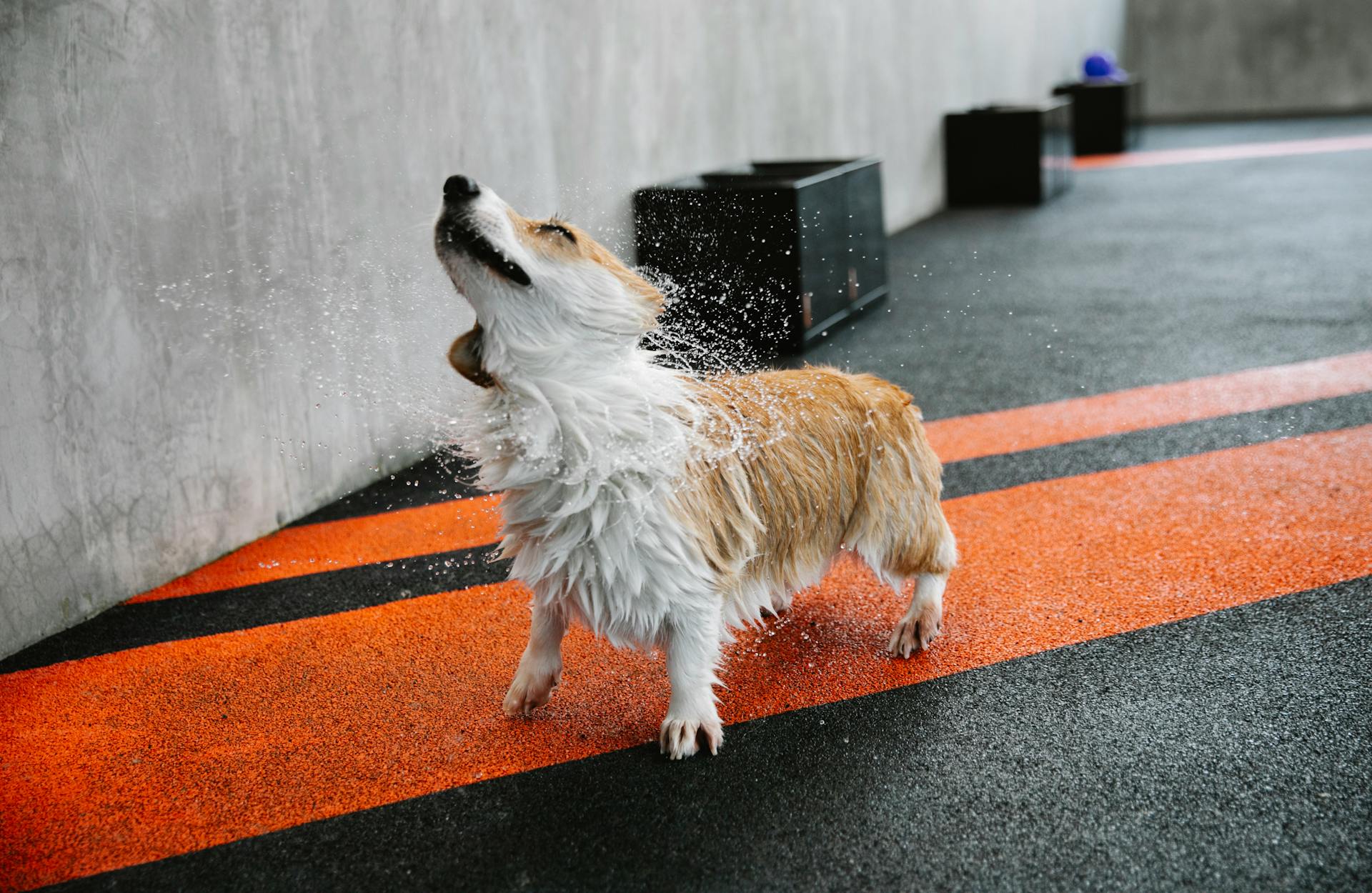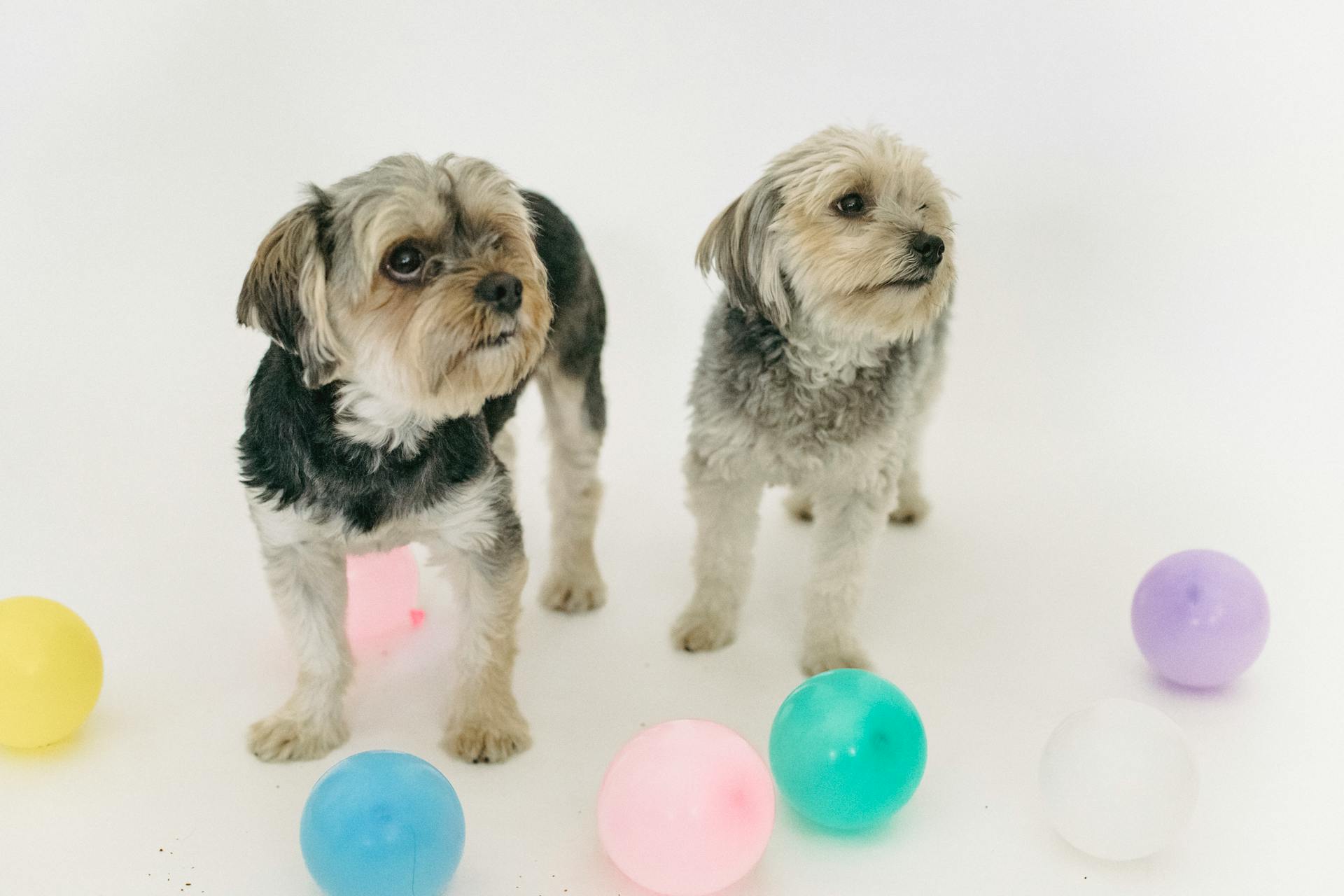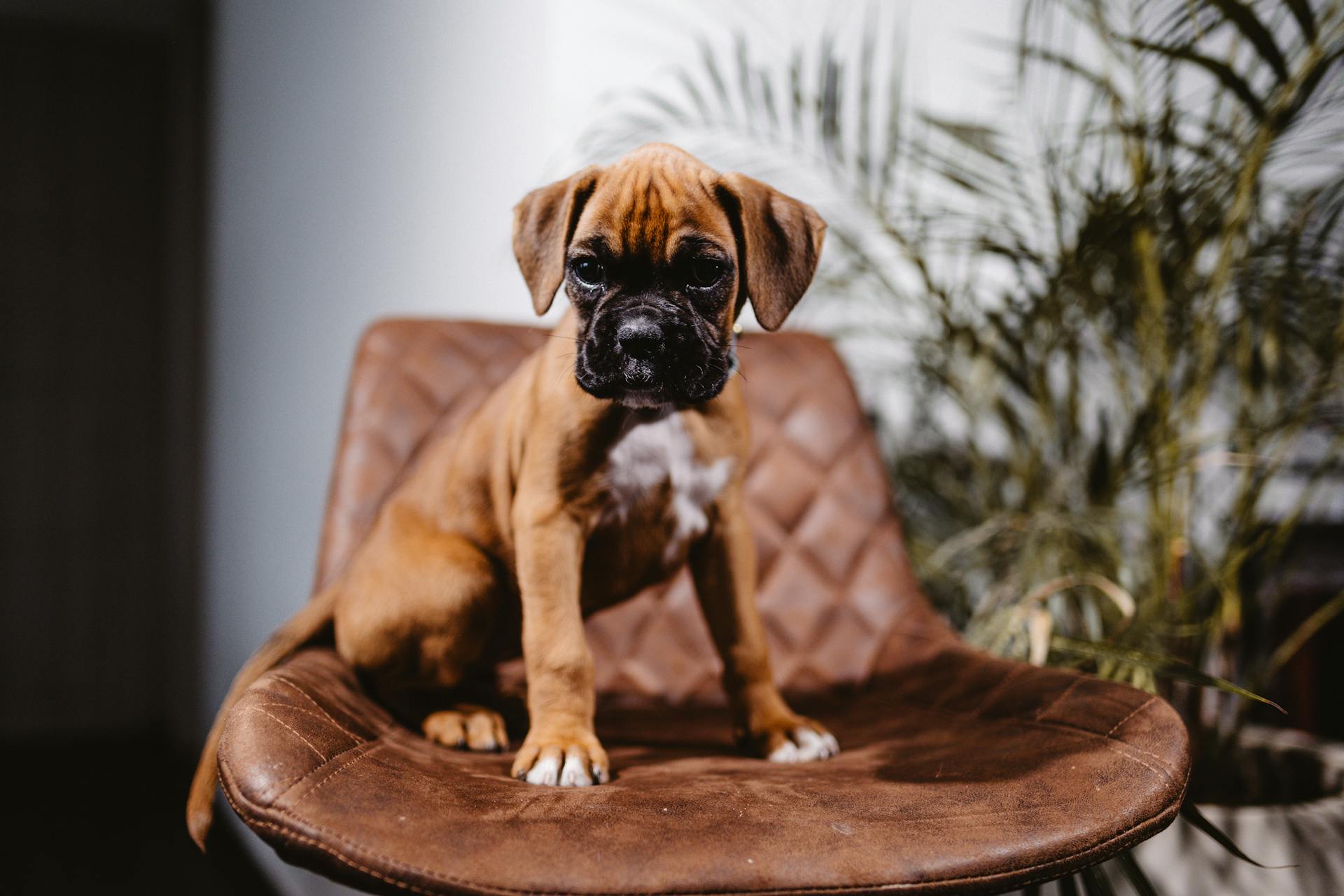
Raising a Chorkie requires attention to their small size and delicate health. Chorkies are prone to hypoglycemia, so it's essential to feed them frequently throughout the day.
Their small size also means they need regular exercise to stay healthy. A daily walk of 15-20 minutes is recommended.
Chorkies are a cross between a Yorkshire Terrier and a Chihuahua, so they can be sensitive to noise and stress. Creating a calm environment is crucial for their well-being.
Regular grooming is also necessary to prevent matting and tangling of their long coats. Brushing their fur daily can help prevent these issues.
Quick Facts
Chorkies are a delightful breed, and here are some quick facts to get you started:
Chorkies originated in the United States.
Their size is toy, making them the perfect companion for city living.
A Chorkie's lifespan is approximately 12-15 years, which is a good amount of time to enjoy their playful and affectionate nature.
Chorkies can have two different coat types: short and smooth like a Chihuahua, or long and silky like a Yorkshire Terrier.
Their coat colors can vary widely, so you may find yourself falling in love with a Chorkie's unique coat pattern.
Chorkies are known for being playful, energetic, loyal, and affectionate, but they can also be stubborn at times.
Daily walks and playtime are essential for a Chorkie's physical and mental well-being.
Regular brushing is necessary for a Chorkie's coat, with professional grooming potentially needed for those with a longer, silky coat.
Chorkies are prone to inheriting health concerns like dental problems, eye problems, and luxating patella, so it's essential to keep an eye on their health.
Here are some common names for this breed: Yorkiechi, Chiyorkie, Yorkie-chi, Yorkchi, York-chi, Chiorkie, and York Chi.
These names might seem like a lot, but they're all referring to the same adorable breed!
Breed Overview
The Chorkie is a designer breed created by crossing the Chihuahua with the Yorkshire Terrier. They're a lightweight, low-shedding companion dog that's perfect for apartment living.
Chorkies are tiny, weighing between 4-10 pounds, and have a double coat that comes in a variety of colors including black, tan, blue, and steel gray. They have a bold and confident personality, but also have a relatively lower-energy demeanor.
Chorkies are a great choice for families without small kids and for multi-pet households. They're also suitable for apartment living due to their moderate exercise needs and minimal shedding coats.
History
The Chorkie is a designer dog breed that originated in the United States in the early 1990s. This was a time when the demand for small, adorable companions was high.
The Chorkie is a mix of a Chihuahua and a Yorkshire Terrier, two purebred breeds. The Chihuahua originated in Mexico, while the Yorkshire Terrier hails from England.
Breeders started intentionally mixing these two breeds to create the Chorkie, which quickly gained popularity. The Chorkie's popularity spread not only in the United States but also to Europe and other parts of the world.
The Chorkie is recognized by several organizations, including the American Canine Hybrid Club, The Designer Dogs Kennel Club, The International Designer Canine Registry, Dog Registry of America, and The Designer Breed Registry.
Using a Breeder
You can find a Chorkie puppy through a breeder, and it's worth noting that some breeders own both parent dogs, while others only have the mother. The breeder may pay for the male dog to inseminate the mother or give the owner of that dog a free puppy from the litter.
The American Canine Hybrid Club and the International Designer Canine Registry may offer help finding a breeder for a Chorkie or other designer breed dogs like the Yorkie-Chi.
To get a Chorkie puppy, you'll likely spend between $400 to $600, depending on whether the parents were show dogs or came from show dog families.
Care and Feeding
Your Chorkie's care and feeding routine is crucial to their overall health and happiness. Regular veterinary checkups are a must to detect any health concerns early.
Keep an eye out for signs of anal gland issues, such as scooting or dragging their bottom on the ground, and consider expressing their anal glands yourself or mentioning it during a grooming appointment.
Maintaining your Chorkie's oral health is also vital, so brush their teeth daily with a veterinarian-approved method, and consider using dental chews to help prevent dental issues.
As for feeding, stick to a regular schedule and limit treats to avoid overfeeding. A high-quality dog food with a good source of protein is recommended, and be sure to ask your veterinarian for personalized dietary recommendations as your Chorkie grows and ages.
Remember, Chorkies are prone to overactive tear glands, so keep a clean hanky or cloth nearby to minimize tear stains, and trim their nails regularly to prevent clicking against the floor.
Feeding
Feeding your Chorkie requires attention to their small stomachs and high energy levels. They need a high-quality dog food that's formulated for small, active breeds.
A regular feeding schedule is essential to prevent overeating and weight gain. Chorkies can easily become overweight, so it's crucial to monitor their food intake.
Adult Chorkies typically require only a handful of food a day, with most needing no more than ½ cup of dry kibble every day. Some Chorkies may need as little as ¼ cup.
It's best to opt for dry food over wet food, as it helps prevent dehydration and reduces the risk of oral health issues. Dry kibble also scrapes off plaque on their teeth, promoting good oral health.
A set meal plan is essential for your Chorkie's well-being, helping them stick to a schedule and learn when it's time to go outside. This also helps prevent overeating and ensures they receive the necessary calories.
Chorkies love treats, but it's essential to limit them to one treat per day to avoid overindulgence.
Exercise
Chorkies need about 1 full active hour of exercise per day, which can be met in a small environment like an apartment, but daily walks are still beneficial.
A good goal is to aim for about 5 miles of walking per week, although this isn't a strict requirement.
Chorkies have a lot of energy and need daily stimulation, so it's essential to take them on a short walk around the block every night and play with them in the morning.
Playing with your Chorkie at home can help burn off excess energy, especially with their favorite toys.
Training and Socialization
Training a Chorkie requires regular sessions that end with rewards and treats, as they thrive on positive reinforcement. This can be as simple as giving a treat for sitting or rubbing their stomach for being a good boy or girl.
Chorkies can get excited around new people or animals, which can lead to accidents or scratches, so socialization is key. Regular trips to the dog park and neighborhood walks can help them become familiar with new surroundings and people.
Positive reinforcement training and socialization can also help curb unwanted behavior and rule out separation anxiety, which can occur if Chorkies are left alone for long periods.
Personality
Chorkies are outgoing, fun, and silly dogs that make great companions, but they can be aggressive with people they don't know, so it's essential to keep them on leashes in public.
They're extremely loyal and loving, which makes them perfect for families with kids, but they can suffer from separation anxiety if left alone for long periods of time.
A few short walks per day with plenty of potty breaks should suffice, as they don't require too much exercise.
Chorkies adore being around their humans and love to participate in activities, so they're best suited for families or households with multiple people.
They can be nervous around new people, but once you're in their good books, you're set.
Training is a must, as they can be sassy and require consistency, but with patience and positive reinforcement, they'll learn quickly.
With proper socialization and training, Chorkies can thrive in any home, but it's crucial to provide them with plenty of attention and interaction to prevent separation anxiety.
Importance of Socialization
Socialization is crucial for Chorkies and other toy breeds. They can get excited around new people or animals, leading to accidents or unwanted behavior.
Regular trips to the dog park are an excellent way to socialize your Chorkie. This helps them become accustomed to new people, animals, and environments.
Socialization should start from the moment you pick up a Chorkie puppy. You can introduce your dog to people of different ages and other animals.
Chorkies that are better socialized are less likely to act out when left alone at home. They learn how to stimulate their brains with toys and activities, reducing the likelihood of destructive behavior.
A Chorkie may get so excited at the sight of a new animal that it tries to hump another dog or cat. This is why socialization is so important.
Regular walks around the neighborhood will also introduce your dog to new people and places. This helps them become more confident and calm in new situations.
Socialization can help prevent separation anxiety in Chorkies. Having multiple pets in the home can also help alleviate this issue.
Health and Wellbeing
Chorkies are generally healthy dogs, but like any breed, they can be prone to certain health issues. Patellar luxation, also known as floating kneecaps, is a relatively common problem in tiny breeds like Chorkies.
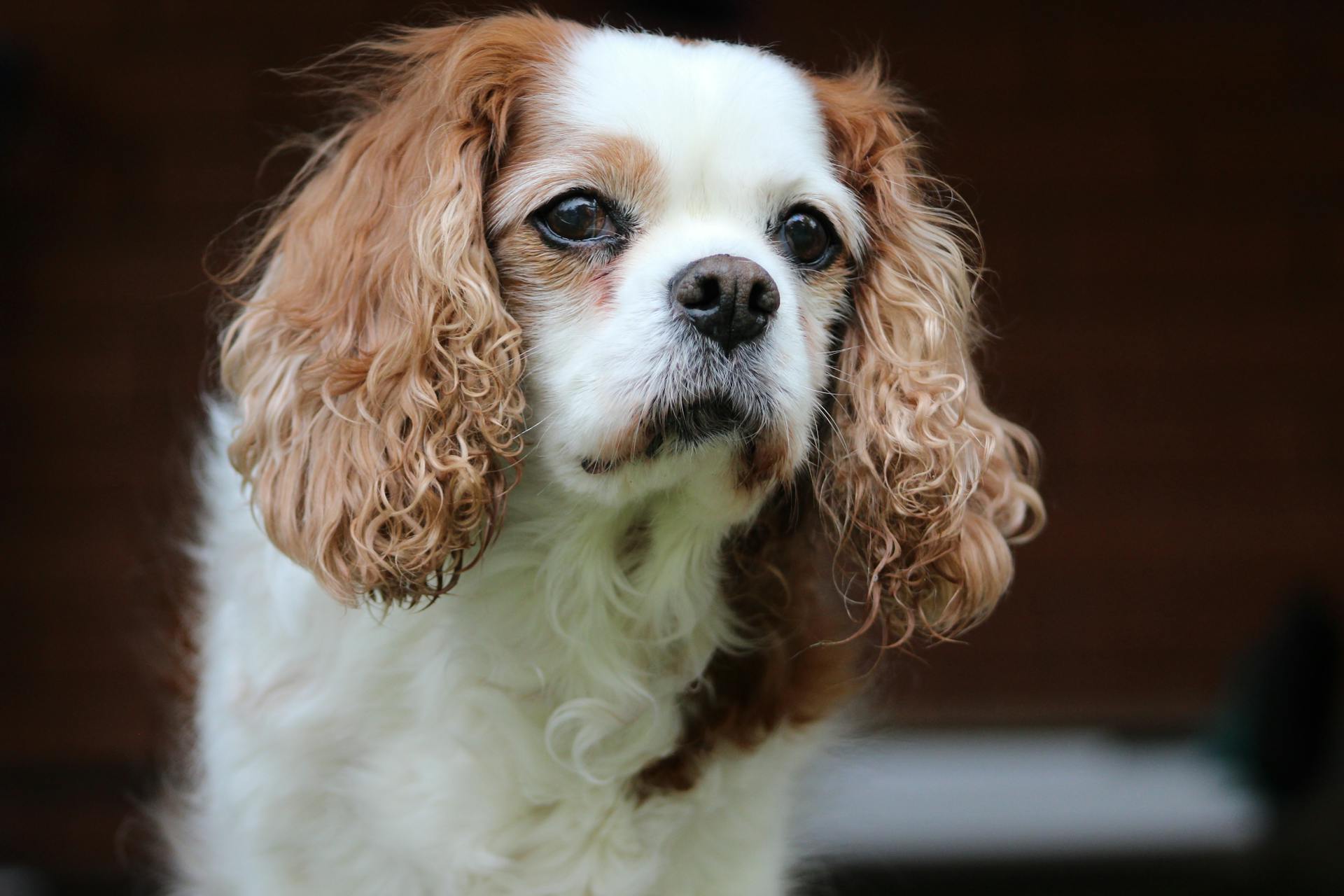
Regular veterinary checkups and a healthy diet can help prevent or manage these issues. It's also essential to maintain good care, including regular brushing to prevent matting and irritation of their dense double coats.
Some common health problems in Chorkies include skin problems, allergies, patellar luxation, hypothyroidism, and dental issues. To keep your Chorkie happy and healthy, make sure to meet their daily exercise requirements and provide a balanced diet.
Here are some specific health concerns to be aware of:
- Patellar luxation: a dislocation of the kneecap that can cause lameness
- Hypothyroidism: an underactive thyroid that can cause weight gain, hair loss, and lethargy
- Dental issues: overcrowding of teeth that can lead to tooth decay, gum disease, and tooth loss
Health
As a responsible Chorkie owner, it's essential to be aware of the potential health issues that can affect your furry friend. Chorkies are generally healthy, but they can inherit some conditions from their parent breeds.
Skin problems are a common issue in Chorkies, which can be caused by their dense double coats and sensitive skin. Regular brushing and dietary fatty acid supplementation can help prevent skin problems.
Allergies are another common health issue in Chorkies, which can cause itching, hair loss, ear infections, and digestive upset. If your Chorkie is allergic, it's crucial to manage their allergies properly.
Patellar luxation, also known as floating kneecaps, is a relatively common issue in tiny breeds like Chorkies. If your Chorkie has patellar luxation, they may experience lameness and discomfort.
Hypothyroidism is another condition that can affect Chorkies, causing metabolic issues like weight gain, hair loss, lethargy, and low tolerance for cold. Thyroid supplementation can help manage this condition.
Dental issues are also prevalent in Chorkies, particularly overcrowding of teeth in their tiny mouths. Regular brushing can help prevent tooth decay, gum disease, and tooth loss.
Here's a list of common health issues that affect Chorkies:
- Skin problems
- Allergies
- Patellar luxation
- Hypothyroidism
- Dental issues
It's essential to keep your Chorkie on a healthy diet and meet their daily exercise requirements to prevent or manage these health issues. Regular veterinary checkups will also help detect any potential problems early on.
Prone to Separation Anxiety
Chorkies don't handle time alone well, so they need regular companionship to prevent separation anxiety.
If you have to leave your Chorkie at home alone, they might become distressed. This is especially true if you don't have any other dogs for them to hang out with.
Chorkies are prone to separation anxiety, which can lead to destructive behavior and other problems.
If you're thinking of adopting a Chorkie, keep in mind that they need a lot of attention and interaction.
They Need Much
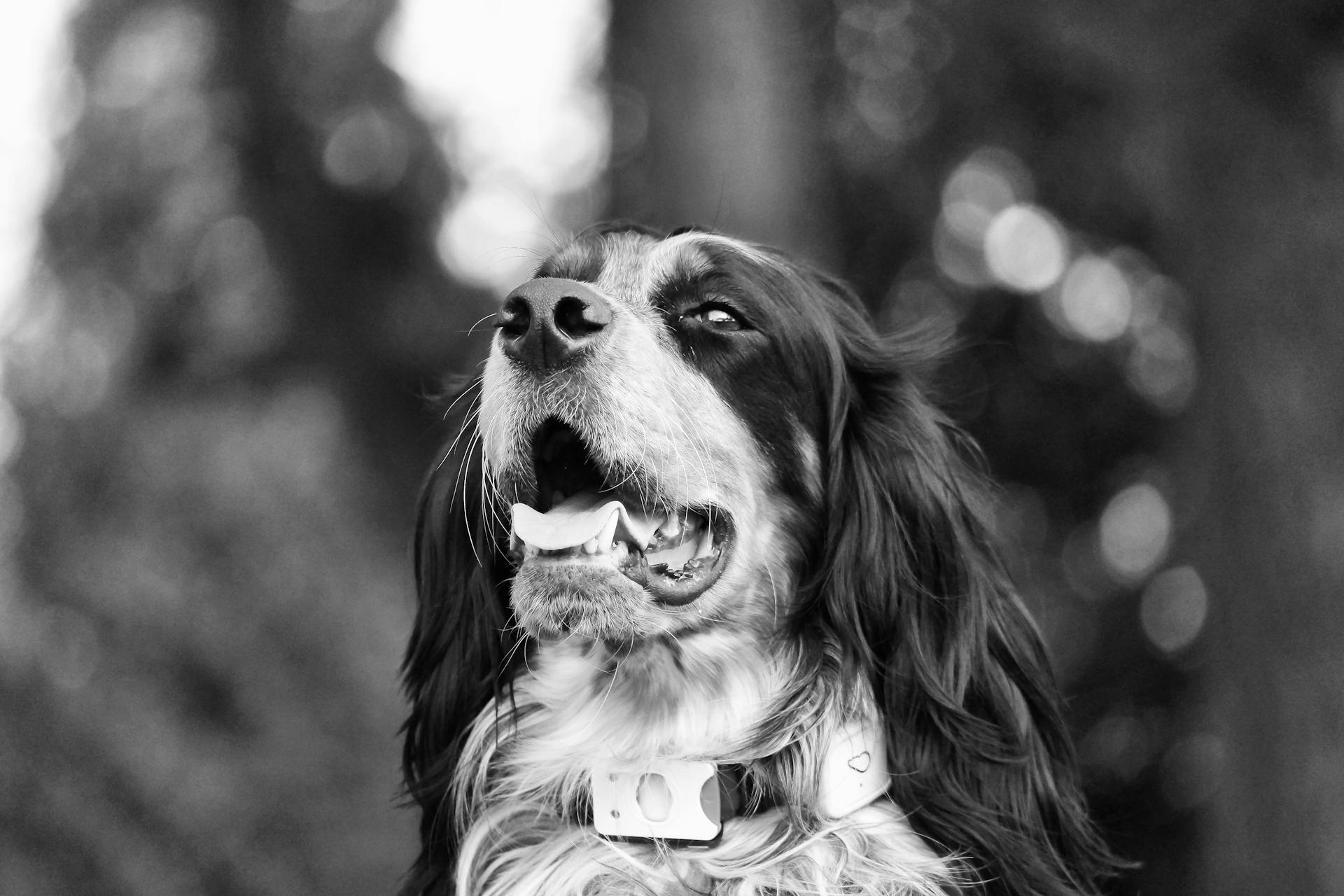
Chorkies require a significant amount of care, particularly when it comes to their grooming. They need to be groomed daily to prevent matting and tangling of their fur.
Their weight range is between eight and 15 pounds, so they're not too big, but still need regular exercise to stay healthy.
To keep them clean, owners should bathe them at least once a month, especially if they spend a lot of time outdoors.
Chorkies typically reach full maturity around six to 12 months, which means they'll need regular check-ups with a veterinarian during this time.
Their lifespan is between 10 to 15 years, which is a significant commitment for any pet owner.
Here's a breakdown of their characteristics:
Appearance and Characteristics
The Chorkie is a small dog breed that typically weighs between 8-15 pounds and stands between 6-9 inches tall. They can come in a variety of colors, including brown, white, silver, blue, and black.
Their coats can be either short or long, and they often have a light-colored, silky, medium-length coat with distinctive eyebrows. Some Chorkies may inherit the Yorkie's hypoallergenic coat, while others may shed more like their Chihuahua parent.
As a mix between a Chihuahua and a Yorkshire Terrier, Chorkies can have a teddy-bear-like exterior and big expressive eyes. They're a fun and adorable breed that's sure to capture your heart.
Size
The Chorkie's size is a notable aspect of their appearance. They are typically small, weighing around 10 pounds and standing between 6-9 inches tall.
Their compact size makes them easy to handle and transport. You can even fit a newborn Chorkie in one hand.
Adult Chorkies usually reach their maximum weight and height at 12 months of age, weighing between 8-15 pounds and standing 6-9 inches tall.
Looks & Appearance
Chorkies come in a wide range of sizes, shapes, and colors, depending on whether they've taken after their Chihuahua or Yorkie parent.
Their small size head, big expressive eyes, and teddy-bear exterior are iconic features of the breed.
Chorkie coats are often a mix of their Yorkshire Terrier and Chihuahua parents' coats and colors, with common colors including brown, white, silver, blue, and black.
Some Chorkies sport a solid color, while others have a mix and blend of colors, like a black and tan coat with markings on their paws and around their face.
For another approach, see: Black Chorkie
Chorkies can have either a silky, human-like coat or a course coat, depending on which parent breed they take after.
They usually have a light-colored, silky, medium-length coat with distinctive eyebrows.
Chorkies can be either long-haired or short-haired, depending on their parent breeds.
Their hypoallergenic coat is a plus for many owners, but it's worth noting that some Chorkies may shed a bit more if they take after their Chihuahua parent.
Family and Living Situation
Chorkies can make wonderful family dogs, but they're not the best fit for families with very young children who can't verbally speak commands or aren't comfortable being in charge.
They're a great choice for city dwellers, as they're small enough to thrive in apartment living - as long as they get their daily walks and exercise.
Chorkies are best suited to homes without small children running around, and they tend to prefer being in a single-pet household where they can get the attention they crave.
They don't do well in the cold, so be sure to dial up the heating during winter or invest in some warm blankets and bedding to keep your Chorkie cozy.
Family-Friendly Dogs
If you're looking for a family-friendly dog, the Chorkie is a great choice, but they do require some supervision, especially around young children who can't verbally speak commands.
They're a loving and playful breed, but their small size can make them prone to injury if handled roughly.
Chorkies are best suited for families with older kids who know how to play with them gently, and they also do well around adults who can provide the attention and affection they crave.
However, it's essential to keep an eye on your Chorkie when they're around other pets, especially larger dogs, as they can get overexcited and try to play games with them.
Early socialization is critical for a Chorkie's success, and introducing them to other pets from an early age can help prevent problems.
In general, Chorkies get along well with other pets, but their smaller size can sometimes make them forget how small they are, leading to accidental injuries.
So, if you're considering bringing a Chorkie into your family, be prepared for a playful and loving companion, but also be mindful of their needs and limitations.
What's the Ideal Home?
If you're considering bringing a Chorkie into your family, you'll want to think about the type of living situation that's best for them. Apartment living is a great option, as long as they get their daily walks and exercise.
Chorkies aren't suited for homes with small, young children running around. They're wonderful family dogs, but they need a calm environment.
They adore attention from their humans, so a single-pet household is often the way to go. This breed doesn't do well in the cold, so be prepared to dial up the heating or invest in some warm blankets and bedding during winter.
Frequently Asked Questions
Can chorkies be left alone?
Chorkies can be left alone, but only for short periods of time. Leaving them alone for extended periods can lead to separation anxiety and other issues
What is a Chorkie puppy?
A Chorkie puppy is a cross between a Chihuahua and a Yorkshire Terrier, also known as a "designer dog." This unique mix of breeds makes for a lovable and popular canine companion.
Is a Chorkie a good dog?
Chorkies can make great companions for some families, but they're not ideal for households with young children due to their delicate nature and tendency to bond closely with one person
What is the lifespan of a Chorkie?
A Chorkie's average lifespan is 12 to 15 years with proper care. Regular veterinary attention and good nutrition are key to a long and healthy life for this breed.
Is a Chorkie a hypoallergenic dog?
Yes, Chorkies are considered a hypoallergenic breed due to their low shedding. They shed very little hair, making them a great option for those with allergies.
Featured Images: pexels.com
